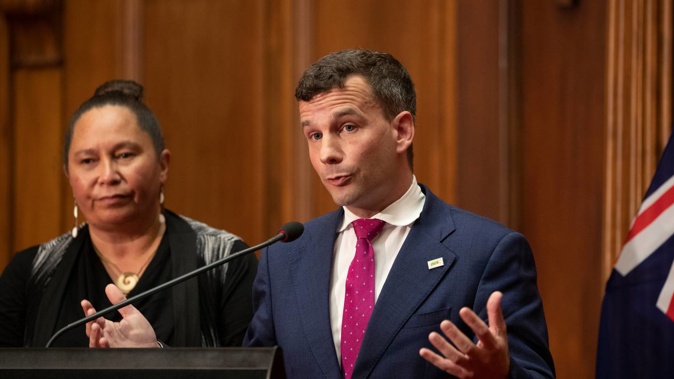
David Seymour has suggested it's time to "move on" from mandates – but scientists have taken apart the argument the ACT leader has used to justify his stance.
In a statement sent to media this morning, Seymour questioned whether vaccine mandates were "still worth the costs to individuals, and social cohesion overall".
To back this up, he provided numbers which he claimed showed vaccination rates were making "little difference" to infection rates under Omicron.
Those were reported cases among unvaccinated, partially-vaccinated and fully vaccinated people over the eight days to Friday.
He calculated that the 347, 140 and 7,035 new cases among those three respective groups equated to rates of 225, 205 and 178 positive cases per 100,000 people.
"All of this leads to a simple conclusion. If there is little difference in the rates of infection and spread of Omicron between vaccinated and unvaccinated people, then what is the point of segregation them?" he said.
"From the opposite perspective, if segregation is increasingly costly and undesirable, what sort of difference in infection rates would we require to justify it, and is the difference between 178/100,000 and 225/100,000 enough?
"Vaccination is still your best bet for staying out of hospital, but even strongly pro-vaccine people like me have to confront what new evidence says about infection rates."
Seymour said it was time to "weigh up the costs that vaccine requirements are placing on individuals, on workplaces, and on social cohesion, and ask whether policies that force vaccination in various settings are still worth it".
But experts have singled out some obvious flaws with Seymour's analysis, which some called naïve, irresponsible - and even misinformation.
Covid-19 modeller Dr Dion O'Neale said one was that his numbers didn't take into account boosters or time since vaccination.
"Two doses of vaccine more than three months ago is indeed poor at blocking infections - hence in people with two doses given four or so months ago, we would expect similar infection rates to the unvaccinated - but much lower hospitalisation."
For people recently boosted, however, infection blocking was 60 to 70 per cent.
And even ignoring that, he said protection against hospitalisation from vaccination was still well worth pursuing.
"This is not simply an individual benefit. Keeping yourself out of hospital is to the benefit of others in the community who might need that bed - car crashes and heart attacks don't stop in a pandemic," he said.
"Asking people with high exposure risk due to their work to be vaccinated still benefits the community."
O'Neale also pointed to the fact that Delta was still lurking in our community.
"Vaccination still offers good protection against infection for Delta. We don't want to forget that the health consequences of Delta are much more severe than Omicron.
"Ensuring extensive vaccination would make sense on the grounds of stopping spread of Delta and other outbreaks, even if it did nothing for Omicron."
University of Auckland vaccinologist Associate Professor Helen Petousis-Harris also criticised Seymour's workings.
"It is very easy for armchair epidemiologists to do some back of the envelope calculations, we all do it," she said.
"However, you can't make policy on it and calculating vaccine effectiveness properly is actually rather complicated and requires a lot more data than you can get from any website."
Firstly, she said one needed to consider a range of demographic characteristics for the people vaccinated and unvaccinated, as this could make a big difference to estimates of effectiveness.
"Another important thing is that testing positive is only one outcome. How long you are infected for is another variable as well as how well you transmit the virus," she added.
"We already know the two doses of vaccine provides little protection against infection with Omicron, but a booster does offer some protection against infection to many people at least for a short time.
"This can make a collective difference."
She echoed O'Neale's point.
"Keeping people out of hospital is not just in the interests of the individual, it is in the whole communities interests – and keeping people working is also in all our interests, so there is a lot more to consider here other than infections, which I may add, will give us all a boost before the next variant appears."
Otago University epidemiologist Professor Michael Baker said it was irresponsible for Seymour to use what he called a "a very crude, back-of-the-envelope calculation" to question the current need for mandates.
Baker said Seymour's argument was "completely at odds" with high-quality, published overseas evidence about the vaccine's effectiveness against Omicron.
"And these show that boosted people are certainly at markedly lower risk of being identified as a case – and at vastly lower risk of dying from Covid-19."
While he said there would be a time to extensively review what mandates were needed, now wasn't it.
"We're about to hit the most intense period of transmission in two years of this pandemic."
All three experts did, however, agree with another point Seymour made: that the ministry needed to improve what data it shared.
"At present, they update the cumulative number of vaccinated, partially vaccinated, and unvaccinated cases each day, but the number of new cases each day can only be derived by saving the data and calculating the change from day to day," Seymour said.
"We face enormous mistrust and dissatisfaction with Government due to this kind of poor transparency that suppresses free and open debate.
"The Government should insist on the Ministry of Health making the data transparent, and even providing analysis so that any confounding variables can also be understood."
Take your Radio, Podcasts and Music with you









